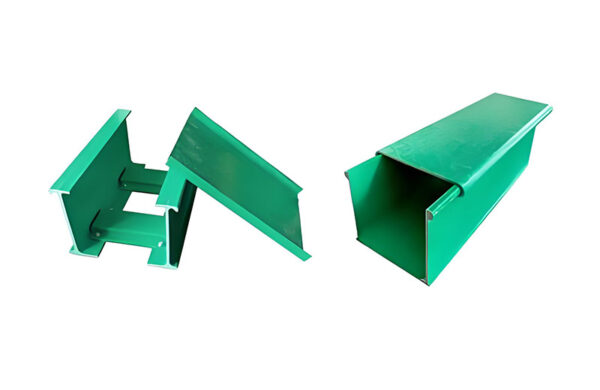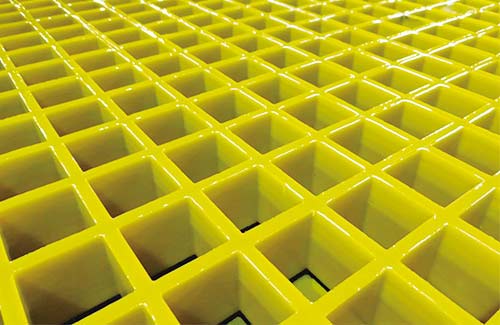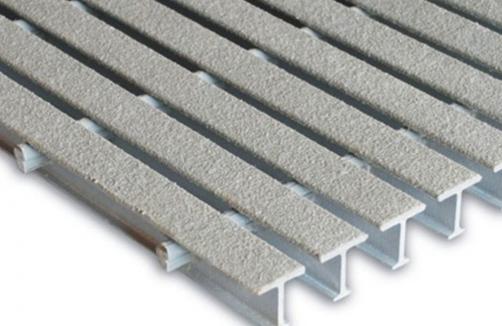In the dynamic and abrasive environment of cement plants, conveyors serve as the backbone for transporting raw materials, semi-finished products, and finished cement. However, these conveyors operate in conditions filled with high temperatures, abrasive particles, moisture, and corrosive substances, which pose significant challenges to the durability and functionality of the components. Fiber Reinforced Polymer (FRP) grating has emerged as an innovative and reliable solution, revolutionizing the way cement plant conveyors are equipped and maintained.
FRP grating is a composite material composed of fiberglass reinforcement embedded in a thermosetting resin matrix. The fiberglass imparts high strength and rigidity, while the resin matrix endows it with excellent corrosion resistance, chemical stability, and thermal insulation properties. This unique combination of characteristics makes FRP grating highly suitable for the arduous working conditions of cement plant conveyors.
One of the primary advantages of FRP grating in cement plant conveyors is its remarkable resistance to abrasion. Cement production involves handling materials like limestone, clay, and sand, which are highly abrasive. Traditional materials such as steel grating can quickly suffer from wear and tear under the constant friction of these particles, leading to reduced structural integrity and frequent replacements. In contrast, FRP grating has a smooth surface and high hardness, effectively minimizing the impact of abrasive materials. This not only extends the service life of the grating but also reduces the maintenance frequency and associated costs for cement plants.
Corrosion is another major concern in cement plants due to the presence of moisture, acids, and alkalis in the production process. FRP grating excels in this aspect with its outstanding corrosion resistance. Unlike metal gratings that can corrode and rust, FRP grating remains unaffected by these corrosive agents, ensuring long – term stability and reliability. For example, in areas where conveyors transport wet cement mixtures or are exposed to cleaning chemicals, FRP grating can maintain its performance without degradation, safeguarding the normal operation of the conveyors.
In addition to abrasion and corrosion resistance, FRP grating offers excellent thermal insulation properties. Cement manufacturing processes generate a significant amount of heat, and high – temperature environments can affect the performance of conveyor components. FRP grating’s low thermal conductivity helps prevent heat transfer, protecting the underlying structures and electrical components of the conveyors. This thermal insulation also reduces the risk of thermal expansion and contraction – related damages, further enhancing the durability of the conveyor system.
The lightweight nature of FRP grating is also a distinct advantage for cement plant conveyors. Compared to heavy metal gratings, FRP grating is much easier to handle, install, and replace. This feature simplifies the installation process and reduces the labor intensity and time required for maintenance. Moreover, the reduced weight of the grating places less stress on the conveyor framework, potentially extending the lifespan of the entire conveyor system.
Customizability is yet another strong point of FRP grating. Cement plants have diverse requirements for conveyor gratings in terms of size, shape, load – bearing capacity, and surface texture. FRP grating can be fabricated to precise specifications, with various patterns and textures available to enhance slip resistance. In areas where workers need to access the conveyors for inspection or maintenance, FRP grating with anti – slip surfaces can significantly improve safety, reducing the risk of accidents caused by slippery conditions.
Furthermore, the use of FRP grating in cement plant conveyors aligns with the industry’s growing focus on environmental sustainability. FRP grating is non – toxic, emits no harmful substances during production or use, and is recyclable at the end of its service life. By choosing FRP grating, cement plants can not only improve the performance of their conveyor systems but also contribute to a more environmentally friendly production process.
In conclusion, FRP grating provides a comprehensive and efficient solution for the challenges faced by cement plant conveyors. Its abrasion resistance, corrosion resistance, thermal insulation, lightweight, customizability, and environmental friendliness make it an ideal choice for modern cement plants. As the cement industry continues to strive for higher efficiency, lower costs, and more sustainable operations, the adoption of FRP grating in conveyor systems is likely to become more widespread, driving innovation and development in the field.







